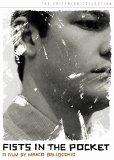
| Cast: | Lou Castel, Paola Pitagora, Marino Mase, Liliana Gerace |
| Genre: | Black Comedy/Drama |
| Director: | Marco Bellocchio |
| Screenplay: | Marco Bellocchio |
| Cinematography: | Alberto Marrama |
| Composer: | Ennio Morricone |
| Runtime: | 105 minutes |
Marco Bellocchio’s debut feature tears the pillars of Italian society – family and Catholicism – to shreds. It’s the kind of first feature you make if you aren’t overly concerned whether you’ll get a second chance. Ironically, this shocking and mocking work of familial discord and resentment was not only made with money Bellocchio borrowed from guess whom, it was even shot in his mother’s country house.
Condemned by both the Catholic Church and Luis Bunuel, an influence and someone who Bellocchio admires, the film focuses on a grotesque family riddled with handicaps. Torn apart by complacency and lack of mobility, the siblings play dangerous games in an attempt to ease their boredom. Epileptic Alessandro (Lou Castel) represents the youth of the 1960’s, filled with pent up rage over the world their predecessors have created and on the verge of trying to do something about it. Fists in the Pocket is something of a seriously demented precursor to uprisings of 1968.
Due to severe psychological repression, arguably creating a mental imbalance, Ale’s big problem seems to be that mounting frustration causes him to fixate on the negative in himself. He’s handicapped without any prospects for marriage or work, a general flunky who repeatedly fails his driver’s test. His own inadequacy makes him despise the inadequacy in everyone else, leading him to the conclusion he should kill his blind mother (Liliana Gerace) and other epileptic brother. By doing so his suave older brother Augusto (Marino Mase) will be freed from his duties of running the family, and thus able to marry his girlfriend.
Their selfish and manipulative sister Guilia (Paola Pitagora) has her own agenda, sending the girlfriend a Corbeau special accusing her brother of cheating on her figuring breaking them up will preserve their family. Ale wants Guilia to work with him to eliminate the rejects in their family, but he can never please her until she goes insane after he pushes their mother off a cliff, about the worst thing one could do in a country that worships motherhood.
Like Bellocchio’s own family, they lack a father. That absence is repeatedly felt in Bellocchio’s body of work, both positively and negatively, but in this case it’s a major problem because the mother doesn’t provide any moral fiber. The character’s physical illnesses are often manifestations of their negative traits, the mother is literally too blind to see. The film of disturbed psychology and morals is actually a black comedy, but it’s film and acted with deadly seriousness. Ennio Morricone’s satirical funereal score is the only hint of the films true intentions.
Ale brings to light everything the family would like to hide through a memorable insane performance by the very normal and unimposing Colombian Castel. A shy, passive and laid back type who looks so harmless, Castel is brilliant at depicting the surprisingly monstrous inner violence of Ale. His searing stare shows the ever-building intensity and madness that is often close to boiling over. His restlessness is depicted through novelle vague style handheld camera, providing an in your face realism which does give way to equally simple classic composition during calmer moments.
Bellocchio brought Castel (playing a burnt out actor) back in a similar role 17 years later in his underrated The Eyes, The Mouth. That film deals with the aftermath of a family member killing himself (suicide of a brother like Bellocchio’s own) and has Castel romantically linked to the new widow (the lovely Angela Molina) rather than the suggested incest of his relationship with his sister in Fists. Perhaps the major similarity of the films is that both deal with the issue of life being too long, thus the need to forcibly bring it to an end because the failures lead to a pain that is simply too great.
Bellocchio is one of those rare directors where you often can’t say whether you really liked or disliked his film even when it’s over. Perhaps what makes him interesting is the way he can deal with the same themes repeatedly without ever repeating himself because his films so much of the time period they depict and so influenced by the passing of time.
While Fists in the Pocket is a good film memorable for Castel’s seething performance, it’s arguably a negative in the grand scheme of cinematic history because of the course it made a big contribution toward setting Italian art film on. The startling effect of Fists ushered in the end of humanist neorealist films and replaced them with darker cynical works. These may have been more complex and nudged you politically, but they didn’t exactly make you feel much compassion for others, and without that it’s hard to make any political change for the better. It’s certainly not fair to blame the originator for the horror inflicted by the imposters, but on the other hand Martin Scorsese’s ten best utilizations of popular music still don’t make up for the million times everyone had to suffer through that wretched Celine Dion Titanic crap.
   |

|
|

|
|
|
|
|
|
|
|
|
|
|
|
|
|
|
|
|